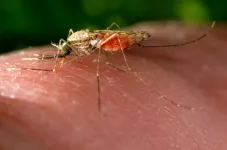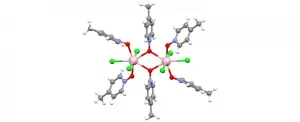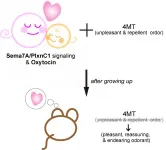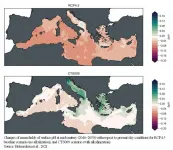Simple genetic modification aims to stop mosquitoes spreading malaria
Genetically modifying mosquitoes to express antimalarial genes and pass them on to their offspring is being tested as a new strategy to eliminate malaria
2021-04-13
(Press-News.org) Altering a mosquito's gut genes to make them spread antimalarial genes to the next generation of their species shows promise as an approach to curb malaria, suggests a preliminary study published today in eLife.
The study is the latest in a series of steps toward using CRISPR-Cas9 gene-editing technology to make changes in mosquito genes that could reduce their ability to spread malaria. If further studies support this approach, it could provide a new way to reduce illnesses and deaths caused by malaria.
Growing mosquito resistance to pesticides, as well as malaria parasite resistance to antimalarial drugs, has created an urgent need for new ways to fight the disease. Gene drives are being tested as a new approach. They work by creating genetically modified mosquitoes that, when released into the environment, would spread genes that either reduce mosquito populations or make the insects less likely to spread the malaria parasite. But scientists must prove that this approach is safe and effective before releasing genetically modified mosquitoes into the wild.
"Gene drives are promising tools for malaria control," says first author Astrid Hoermann, Research Associate at Imperial College London, UK. "But we wanted a clear pathway for safely testing such tools in countries where the disease most commonly occurs."
In the study, Hoermann and colleagues genetically modified the malaria-transmitting mosquito Anopheles gambiae. They used the CRISPR-Cas9 technology to insert a gene that encodes an antimalarial protein amidst genes that are turned on after the mosquito eats a blood meal. The team did this in a manner that allowed the whole section of DNA to also function as a gene drive that could be passed on to most of the mosquitoes' offspring. They initially inserted the gene along with a fluorescent marker to help them track it in three different spots in the DNA, and then later removed the marker, leaving only a minor genetic modification behind.
Next, the team bred the mosquitoes to see if they were able to successfully reproduce and remain healthy. They also tested how well the malaria parasite developed in the mosquitoes' guts. Their experiments provide preliminary evidence that this approach to genetic modifications could create successful gene drives.
"These genetic modifications are passive, and could be tested in the field and undergo a stringent regulatory process to ensure they are safe and effective in blocking the parasite without raising concerns of accidental spread in the environment," explains senior author Nikolai Windbichler, Senior Lecturer at the Department of Life Sciences, Imperial College London. "However, once we combine them with other mosquitoes with an active gene drive, they turn into gene drives themselves without the need for any further changes. Our approach thus brings gene drives one step closer to being tested in the field as a malaria elimination strategy."
INFORMATION:
This study was originally posted as a preprint on bioRxiv and reviewed using eLife's Public Review service, which provides public peer reviews of preprints for the benefit of the authors, readers and others interested in our assessment of the work. To view the preprint and accompanying peer reviews, visit https://www.biorxiv.org/content/10.1101/2020.05.09.086157v1.
Media contacts
Emily Packer, Media Relations Manager
eLife
e.packer@elifesciences.org
+44 (0)1223 855373
Hayley Dunning, Media Manager (Natural Sciences)
Imperial College London
h.dunning@imperial.ac.uk
+44 (0)20 7594 2412
About eLife
eLife is a non-profit organisation created by funders and led by researchers. Our mission is to accelerate discovery by operating a platform for research communication that encourages and recognises the most responsible behaviours. We aim to publish work of the highest standards and importance in all areas of biology and medicine, including Genetics and Genomics, while exploring creative new ways to improve how research is assessed and published. eLife receives financial support and strategic guidance from the Howard Hughes Medical Institute, the Knut and Alice Wallenberg Foundation, the Max Planck Society and Wellcome. Learn more at https://elifesciences.org/about.
To read the latest Genetics and Genomics research published in eLife, visit https://elifesciences.org/subjects/genetics-genomics.
About Imperial College London
Imperial College London is one of the world's leading universities. The College's 20,000 students and 8,000 staff are working to solve the biggest challenges in science, medicine, engineering and business.
Imperial is the world's fifth most international university, according to Times Higher Education, with academic ties to more than 150 countries. Reuters named the College as the UK's most innovative university because of its exceptional entrepreneurial culture and ties to industry.
Imperial staff, students and alumni are working round-the-clock to combat COVID-19. Imperial has nearly two thousand key workers, and is at the forefront of coronavirus epidemiology, virology, vaccine development and diagnostics. More than one thousand Imperial staff and students are volunteering to support the NHS.
http://www.imperial.ac.uk
[Attachments] See images for this press release:

ELSE PRESS RELEASES FROM THIS DATE:
2021-04-13
Many consumers are willing to pay for improved environmental quality and thus non-market values of impacts of food production on e.g. water quality, C sequestration, biodiversity, pollution, erosion or GHG emissions may even be comparable to the market value of agricultural production. Diverfarming project elucidated how consumers value agroecosystem services enabled by diversification and provided consumer perspectives for developing future agricultural and food policies to better support cropping diversification.
The researchers quantified consumers' willingness to pay for the benefits of increased farm and regional scale diversity of cultivation practices and crop rotations. Three valuation scenarios were presented to a ...
2021-04-13
Spain boasts the largest cultivated area of almond trees in the world, with more than 700,000 ha (MAPA, 2018), but ranks third in terms of production. How can this be? Actually it's easy to explain: most of the country's cultivated area of almond trees is comprised of traditional rainfed orchards and located in marginal areas featuring a low density of trees per hectare.
Over the last decade, however, the nut's surging prices havegiven rise to intensive almond tree plantations characterised bya high density of trees per hectare and the employment offertilisation and irrigation, yielding endless rows of white when the trees are in bloom. Knowing what the future of these plantations will be like in a ...
2021-04-13
With summer around the corner, a project shows how implementing an evidence-based mindfulness program in a summer camp setting decreases emotional distress in school age children and empowers campers and counselors alike - enhancing camper-counselor relationships. Mindfulness - a state of consciousness that fosters awareness - has the potential to help regulate emotions and behaviors.
Researchers from Florida Atlantic University's Christine E. Lynn College of Nursing implemented an eight-week program guided by the Mindful Schools© curricula in a large urban summer day camp program (ages 3 to seventh grade). Mindfulness-based practices are intentional exercises ...
2021-04-13
Light can be used to operate quantum information processing systems, e.g. quantum computers, quickly and efficiently. Researchers at Karlsruhe Institute of Technology (KIT) and Chimie ParisTech/CNRS have now significantly advanced the development of molecule-based materials suitable for use as light-addressable fundamental quantum units. As they report in the journal Nature Communications, they have demonstrated for the first time the possibility of addressing nuclear spin levels of a molecular complex of europium(III) rare-earth ions with light. (DOI: 10.1038/s41467-021-22383-x)
Whether in drug development, communication, or for climate forecasts: Processing information quickly and efficiently is crucial in many areas. It is currently done using digital computers, ...
2021-04-13
Imprinting is a popularly known phenomenon, wherein certain animals and birds become fixated on sights and smells they see immediately after being born. In ducklings, this can be the first moving object, usually the mother duck. In migrating fish like salmon and trout, it is the smells they knew as neonates that guides them back to their home river as adults. How does this happen?
Exposure to environmental input during a critical period early in life is important for forming sensory maps and neural circuits in the brain. In mammals, early exposure to environmental inputs, as in the case of imprinting, is known to affect perception and social behavior later in life. Visual imprinting has ...
2021-04-13
New research led by a professor at NUI Galway is set to change how doctors treat some patients with high blood pressure - a condition that affects more than one in four men and one in five women.
The study by researchers at NUI Galway, Johns Hopkins University and Harvard Medical School found no evidence that diastolic blood pressure - the bottom reading on a blood pressure test - can be harmful to patients when reduced to levels that were previously considered to be too low.
Lead researcher Bill McEvoy, Professor of Preventive Cardiology at NUI Galway and a Consultant Cardiologist at University Hospital Galway, said the findings have the potential to immediately influence ...
2021-04-13
New research by the University of Kent and the SWPS University has discovered that national narcissists are more likely to support greenwashing (misleading information about the environmental benefits of a product, a company or a policy) in order to improve their nation's public image.
Findings show that while national narcissists are not likely to support genuine pro-environmental campaigns, they are ready to support political greenwashing campaigns. In business greenwashing decreases consumers' trust and undermines both the image and the profits of the companies that use this strategy. In the realms of politics, it may garner ...
2021-04-13
Is it possible to simultaneously address the increase of the concentration of carbon dioxide (CO2) in the atmosphere and the resulting acidification of the oceans? The research of the project DESARC-MARESANUS, a collaboration between the Politecnico di Milano and the CMCC Euro-Mediterranean Center on Climate Change Foundation, explores the feasibility of this process, its chemical and environmental balance, and the benefits for the marine sector, focusing on the Mediterranean basin.
It is now widely recognized that in order to reach the target of limiting global warming ...
2021-04-13
A five-year study of mule deer does and newborn fawns in western Wyoming shows that migrating deer have a lot to balance when it comes to birth timing.
The study led by University of Wyoming scientists challenges the long-held assumption that animals match offspring birth with the peak green-up of forage at the birth site. Instead, only deer that migrated long distances and followed the flush of spring green-up from low elevation winter ranges to higher-elevation summer ranges were able to match birth with peak green-up. Other deer migrated shorter distances and gave birth earlier, but birth was out of sync with green-up.
The researchers' work appears in the journal Ecology.
To ...
2021-04-13
Light beams are widely used in photonics applications and attracted immense research interests. Compared to homogeneously polarized light beams, vectorial optical fields (VOFs) with tailored wave-fronts and inhomogeneous polarization distributions exhibits more advantages in applications comparing to their scalar-wave counterparts, thanks to the added degree of freedom (DOF) of polarization. By tailoring the polarization distributions, special VOFs such as flap-top beams and radially polarized beams can be generated, being highly favored in super-resolution microscopy, optical manipulations, etc.
Despite of great advances in applications, generation of such complex VOFs are far from satisfactory. Available methods ...
LAST 30 PRESS RELEASES:
[Press-News.org] Simple genetic modification aims to stop mosquitoes spreading malaria
Genetically modifying mosquitoes to express antimalarial genes and pass them on to their offspring is being tested as a new strategy to eliminate malaria








